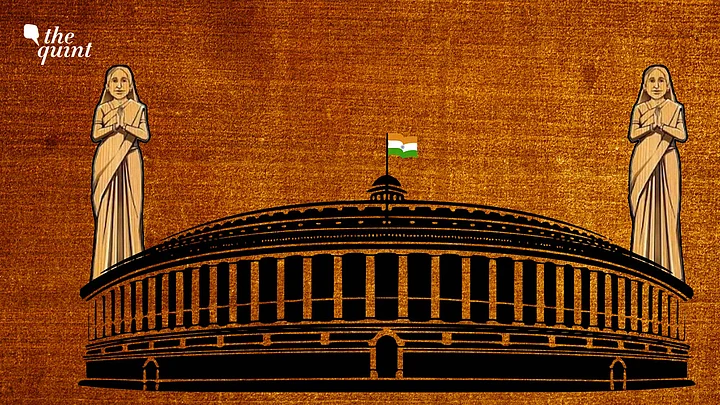The Women’s Reservation Bill that seeks to provide 33 percent reservation for women in the Lok Sabha, the state Assemblies, and the legislature of the National Capital Territory of Delhi, was passed by the Lok Sabha on Wednesday, 20 September.
The bill, brought in as the 128th Constitutional Amendment Bill 2023, also extends the quota to the seats reserved for Scheduled Castes and Scheduled Tribes, and is likely to be passed by the Rajya Sabha, even though several parties are unhappy with certain aspects of it.
Women’s Reservation Bill: BJP’s Moment To Shine?
That the bill has been brought out of its hibernation — it was passed in the Rajya Sabha in 2010 during the tenure of the United Progressive Alliance (UPA) government, after which it lapsed — and will soon be on its way to becoming a law, is already being trumpeted by the Bharatiya Janata Party (BJP), the ruling party at the Centre, as yet another one of its "historic” achievements.
Of course, successive governments, including that led by the Congress, worked for years to bring this bill into effect, but they were stymied by strong opposition to it from other parties. The BJP can and will claim credit as it is their government, which has the numbers in both the Rajya Sabha and the Lok Sabha, that will finally manage to push through the legislation to give women fair representation in India’s electoral democracy.
As Prime Minister Narendra Modi grandly put it on the floor of the new Parliament building: he has been chosen by God for the task of empowering and strengthening women.
Expect many more such high-blown statements from Modi and other BJP leaders with regard to the women’s reservation law in the run-up to the general elections in 2024.
Along with the Abrogation of Article 370, the opening of the opulent Ram Mandir in Ayodhya, this will be played, and played relentlessly, as yet another 'trump card’, one that is aimed specifically at the important vote bank of women.
Reservation May Take Years To Kick In
But let us pause and look at what exactly the bill achieves with regard to empowering women.
The bill states that the 33 per cent reservation will kick in only after the next delimitation exercise (the redrawing of constituencies) has been carried out based on the latest census data. Now the Census, which was supposed to take place in 2021, was pushed back because of the outbreak of COVID 19 and is yet to be held.
Even if it is held next year — which is unlikely since it is an election year — delimitation itself is frozen until 2026. Hence, the earliest that you can expect to see women’s reservation coming into force is the 2029 general elections.
In other words, while the BJP will congratulate itself for midwifing the legislation, and brandish its singular commitment to women’s rights, it does not have to implement the law right now, and nor does it have to deal with the wrath of many male MPs and MLAs who continue to seethe at the idea of reserving seats for women. Talk about a win-win situation.
Congress: ‘Implement the Law Now’
Needless to say, most Opposition parties, including the Congress, which has consistently been at the forefront of the effort to pass the Women’s Reservation Bill in the past, are insisting that the government remove the conditionality clause and implement the bill at once.
Yoking women’s reservation to the delimitation exercise, which will be carried out at an uncertain future date, is tantamount to putting the law on ice, they say.
They have a point. Delimitation, whenever it happens, is likely to be severely contentious. It will, in all probability, reduce the proportion of seats from the South in the increased number of seats in Parliament, since the southern states have better development metrics than the states in the North, and, hence, a lower growth rate of population. The southern states will not take kindly to seeing their representation in Parliament cut back, and there may be legal challenges to it.
Hence, in its current form, all that the Women’s Reservation Bill does is continue to feed the mirage of a 33 per cent reservation for women in Parliament and State Legislatures, without any likelihood of it coming into effect anytime soon.
Eye on 2024 Elections
The Congress and many other Opposition parties are also demanding a quota within a quota, pressing for seats to be reserved for women from Other Backward Castes (OBCs) within the 33 per cent quota.
Though this provision was not part of the bill passed in the Rajya Sabha in 2010, the Congress has made a subtle pivot on this score, no doubt to play up to OBC sentiments. In her speech in Parliament on 20 September, Sonia Gandhi called for a caste census to ensure adequate representation for women from the SC, ST, and the OBCs.
Clearly, though the bill may indeed be passed into law, the politicking around it is only just the beginning.
While the BJP will doubtless leverage it to paint itself as the unparalleled champion of women before it faces the electorate in 2024, the Opposition may rightfully put question marks on the ruling party’s intent, since by linking the law to delimitation, the government has wriggled out of the job of implementing it.
Even after the 128th Constitutional Amendment Bill is passed, 33 per cent reservation for women in the Lok Sabha and the State Legislatures will continue to remain nothing more than a promise, and moreover, one mired in delays and complications.
As always, it is so much easier to talk about empowering women than actually empowering them.
(Shuma Raha is a journalist and author. She tweets @ShumaRaha. This is an opinion piece and the views expressed are the author’s own. The Quint neither endorses nor is responsible for them.)
